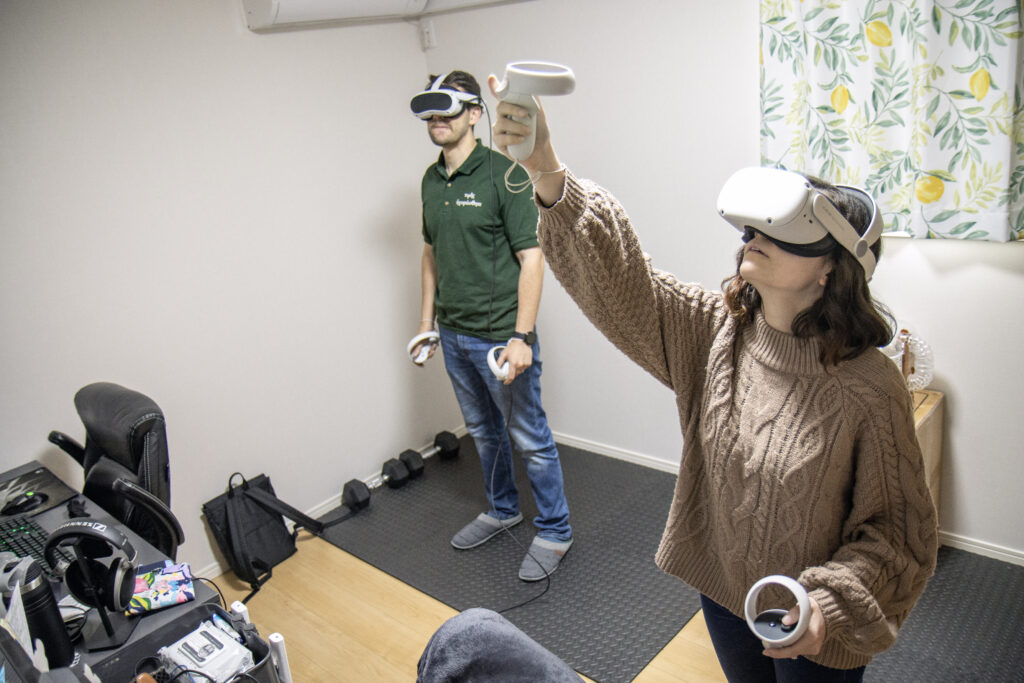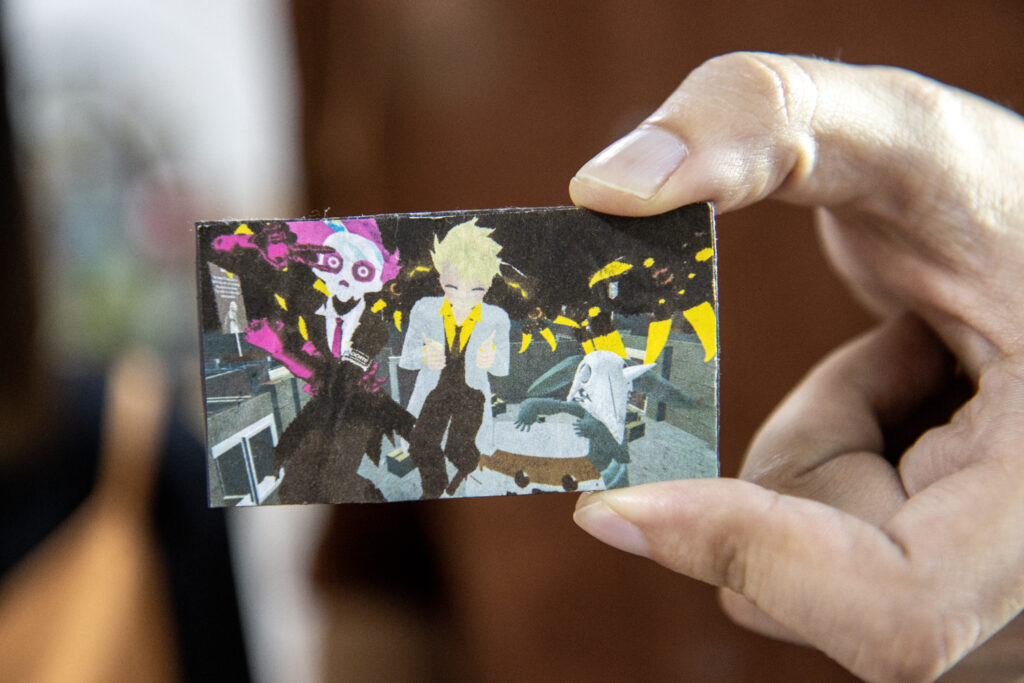Editor’s Note: We first introduced Justin and Michaela Knippers to you with their origin story showing how their unique ministry began. This second piece is a continuation of their life as new IMB missionaries and how they use virtual reality to share about a very real Jesus.
Michaela Knippers grabs the bulky virtual reality goggles off the desk and tightens them onto her head. Her husband, Justin, is already strapped in and waving his hand in the air to scroll through different maps he sees through the goggles.
As new International Mission Board missionaries to Osaka, Japan, they’ve been studying Japanese all day and their brains need a break. For these 20-somethings, that means jumping into the virtual world — a video game simulating reality that, for them, is both relaxing and their place of ministry.
The couple finds a spot to chill in a virtual backyard that resembles countless real ones — neon tiki lights, Texas-sized mosquitos buzzing around, potted plants and multi-colored flowers. In the back corner, Justin spies some friends around a fire pit and presses his controller forward to walk over. Within minutes, the missionary shares an insight from Scripture.

Justin and Michaela Knippers, IMB missionary, use virtual reality as part of their ministry in Japan. The couple meet up with Japanese and others from around the world in VR-Chat and have gospel conversations that lead to “in real life” relationships with God. Japan is a hotspot for virtual reality. IMB Photo
“Virtual reality evangelism isn’t really any different from regular evangelism,” Justin says, explaining how it works. “You find a common point, build a relationship and draw the conversation to the gospel.”
Michaela pushes her goggles up and scrunches her nose, thinking about that statement. “Well, once you get past the fact that you are in a video game and telling someone who looks like Sponge Bob or a neon red panda about Jesus … yeah, it’s the same!”
In the virtual world, you can be anyone or do anything you want. No one in real life could ever recognize you. Players are known by gamer names and choose an avatar — often a cartoon or manga-like character — to represent themselves as they move through different virtual spaces known as maps.
This particular game, VRChat, is all about socializing. No one “wins.” The whole point is to connect and talk to people. Michaela explains most in the game are lonely and looking for a solution to their problems, just like she was years ago in Tulsa, Oklahoma. Virtual reality seemed like the perfect fit for her as an introvert. You can be anything you want online without ever leaving the house. This severe social withdrawal, anxiety and reclusiveness is so common in Japan that there’s even a Japanese word for it — hikikomori.
Around 171 million people use VR technology globally. There are no reliable statistics yet on spiritual lostness among this people group encompassing mostly adolescents to age 34 living in some of the least reached areas of the world. Michaela knows from experience, though, that it just takes one person shining Jesus’ light to make a difference.
Justin was the first Christian Michaela met who spoke about Jesus in the virtual world. It didn’t take long to see the solution to her greatest problem — spiritual lostness — was the gospel. The now-married couple teams up to be a steadfast missionary presence through digital innovations. They recognize their unique interests and skills in the gaming world means they might be the only ones to share the gospel with those in the virtual world where they serve.

The very first picture Michaela and Justin Knippers took together was in the virtual reality world where they met. The couple now use VR as a tool for sharing the gospel in Japan. IMB Photo
“Virtual reality is just one of many tools missionaries use to reach out to the lost around them,” Justin says.
A typical foray into this world of ministry for the couple might mean chatting with a woman in the Netherlands, a Muslim man in the Middle East or an atheist from Japan. In virtual reality, there are no borders. You can log in at any time, and because it’s a global game, someone is waiting to chat and interact.
“One advantage of this ministry is flexibility and safety,” Justin says as he talks about sharing Christ with a Muslim friend who lives in an area of the world closed to Christian workers. “If you aren’t putting your name out there or your real face, it’s hard for someone to find out who you are for persecution purposes.”
The couple pray with people, disciple and share seeds of the gospel online. One time Justin used the side of a virtual barn to draw a visual plan of salvation. They are working on a way to pull links and websites out of their online characters’ hands that leads to language-specific information using the vast array of IMB networks around the world.
The missionary points out that while virtual reality is a good entry point for gospel access, it is important to find someone “in real life” (IRL) to follow up and disciple the new believers. This is why they study Japanese, so they can relate at a heart level in one of the most tech-savvy countries in the world.

Hanami parties are a tradition in Japan when the cherry blossoms bloom. Michaela and Justin Knippers picnic with some Japanese friends in Tennoji Park. The couple attended several Hanami parties to celebrate spring. IMB Photo
Recently, they visited a Japanese language-only virtual world and invited many to an “in real life” video game party. Veteran missionaries and local Japanese believers gather once a month to play all types of games and engage in gospel conversations. One young adult the Knippers invited was told by his parents he needed to get out of the house and be with real people. His parents are against anything religious but were more than happy to have him go to the party for social interaction. The missionaries have slowly introduced aspects of the gospel to the young man, in person and virtually.
This young Japanese adult is a reminder that although virtual reality isn’t the real world, there are real people inside of it who need the gospel. Michaela asks you to pray for him and the many others searching for hope in the virtual world.
Ask God to help the Knippers learn Japanese so they may transition relationships from VR to IRL.
Pray for more missionaries who are willing to use the newest innovations and technologies to reach the world for Christ.